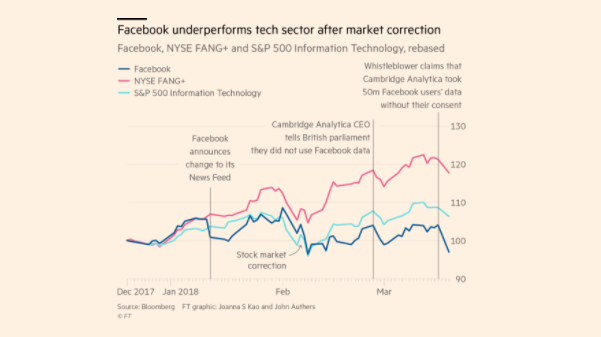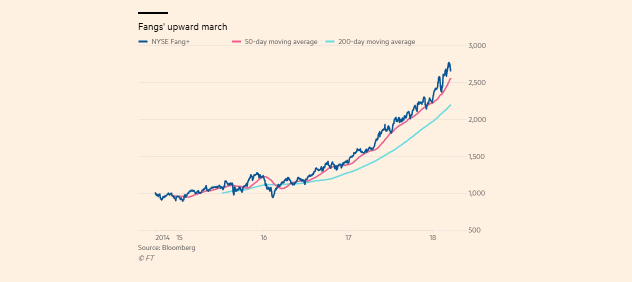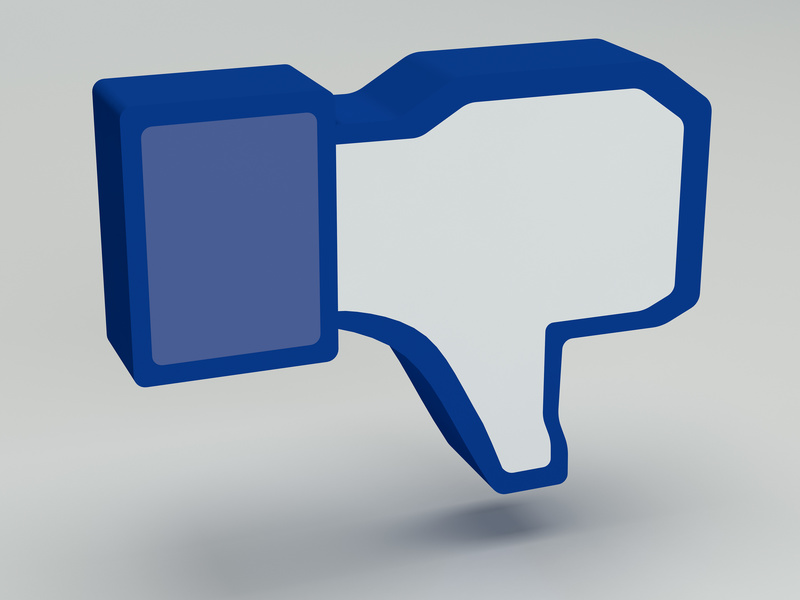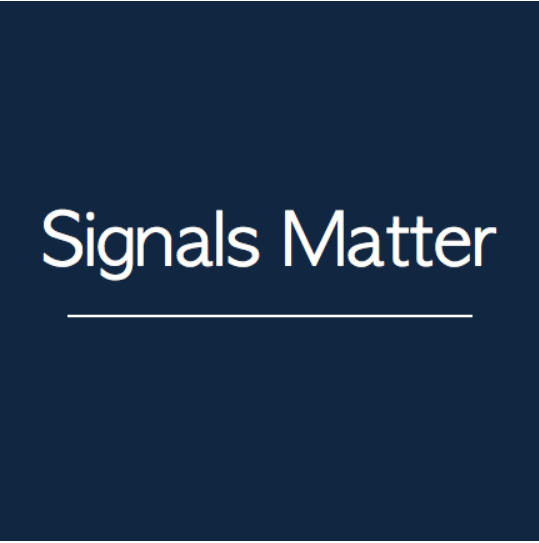Below, we look at Facebook from every angle—the philosophical/sociological, the political and the share price. Net conclusion: bad values, bad valuation.
Here at Signals Matter, we write about markets not sociology or the larger existential questions of what it means to be a vibrant, social human being. When it comes to the topic of Facebook, we should therefore avoid social commentary and stick to questions of market valuation rather than social values.
But I, at least, can’t help myself…
I need to first say a little more about Facebook—and not just about the political ramifications of the current and growing scandal surrounding Cambridge Analytics—a topic I will also address below…
Certainly, the current headlines bother us too. We, the founders of Signals Matter, floated in areas of intelligence gathering and not just securities markets, and so we have an opinion or two about privacy rights, the Orwellian “new normal” of social media hacking into our lives—from abroad or within our own boarders.
But first, let’s get a bit philosophical before we get political or fiscal.
A. Old School Philosophical Musings…
As Nassim Taleb quipped, Harvard alumni have an annoying way of slyly referencing their “Harvard Status” at every opportunity—and he’s right. It’s off-putting. Yet here I go anyway…
I went to Harvard—and even more strangely, knew a few of its Harvard Facebook founders—one I admire very much—and it’s not Zuckerberg…
I won’t risk anecdotal slander here and whistle-blow any details relating to personal facts. I will, however, give this admittedly biased opinion: surmising what I can (and knowing what I know) about Mr. Zuckerberg’s personality, the very tragic fact that this particular personality is now responsible for the architecture of modern social interaction is the height of irony.
A Low Bar…
In short, he (and the generation who swoon over him or work under him) is not the highest bar, not even close, to a healthy standard of genuine intimacy, meaningful engagement, or healthy socializing.
Having Zuckerberg et al steer our social consciousness is thus akin to having Dr. Seuss steer the office of the Surgeon General…
In my opinion only, Facebook is the very opposite of a socializing standard, and personally, I would prefer going homeless before ever taking a salary from this organization—regardless of the size.
There Are Better Ways to ‘Connect’
Why? The answer would take hundreds of pages, and bore (as well anger) most of you. After all, lots of folks love Facebook. It provides easy access to long lost friends and photo sharing platforms of babies, palm-tree getaways, smiling party go-ers and alas—connection. Connection is good, right?
Not the Facebook kind of connection, which ultimately (but again, not always…) boils down to advertising (of one’s self or one’s product), not genuine connection—the kind that takes effort, humility, and lean-into-the-table depth.
Facebook is not really about this. It’s not about “connecting us” but more about “look at me”—my stuff, my life, my happiness and my travel skills. Mostly (though of course not entirely), it’s a platform for comparing rather than connecting. It forces users into an addictive and dangerously comparative kind of outwardness and insecurity, not a one-on-one intimacy.
C’mon. Be honest—deep down, we know this, we feel it.
Many today don’t know how to communicate or speak with the skills of prior generations raised before the advent of mass texting and online chats.
Friends are rare. Montaigne once wrote that we are lucky if we find a single true friend in a lifetime. To have hundreds of “friends” (and hence Facebook status) is not only impossible, it’s a slowly evolving insult to the very majesty of actual…alas: friendship.
I feel Facebook (and its massive employee ranks of the selfie-generation) has taken its insecurity-based origins and devolved them into a sociological norm. I think it has cheapened the modern notion of connection, not deepened it.
Which is why many relations of the modern era treat relationships like video games rather than hard work. If you get bored or tired…if a real challenge arises, many just switch games. The art of deep speaking, connecting, and even confessing (and hence deep relationships) has slowly given way to a new attitude of quips and likes; or even worse: delete and move on. Upgrade.
But again, to unpack this theme would take a book, and this is not the kind of book I want to write. (I’m certain I’ve already upset half our Facebook-using subscriber base…But deep down, ask yourself this: has Facebook really added joy to your life? Deepened the quality of your relationships? Really?).
Relationships are the only true wealth that lasts—not our toys and 1040’s. So, if Facebook (and making yourself into a “brand’) has become the modern avenue to this fragile yet immeasurable asset, then that is, well: sad…
But yes, Facebook certainly allows for rapid and broad connection—heck we use it to promote this very site. I use shaving cream too—but that doesn’t mean shaving cream is worthy of awe. Soap works just as well…
B. Back to The Political
But let’s get back to politics and markets, and, thus, back to the topics of Signals Matter.
And what are the political signals as to recent Facebook headlines telling us? First, they remind us that Facebook makes money by harvesting your personal data and recycling that into the hands of product pushers—from tooth paste and real estate, to alas, stock signal sellers like SignalsMatter.com…
It’s actually pretty creepy how it all works. Like it or not, we are all part of the new commerce, the new “advertising.” In essence, Facebook takes your personal data (and not just “relationship status”) and sells it to the marketing arms of retailers who think your profile matches their widget.
Ok. Kind of creepy, but we get it. Or do we?
After 9-11, when the NSA and other legislative measures effectively declared martial law over your right to privacy (and numerous other constitutionally-granted civil liberties) in the name of public security, most American’s said “OK.”
That is, we were reluctantly and then casually willing to accept certain limits on personal liberties in the name of (war on terror) securities—despite Ben Franklin’s sagacious warning that those who give up liberty in the name of security deserve neither…
The question that the recent Cambridge Analytics scandal touches today shares similar bottom-line tensions.
That is, Facebook users are now wondering if it’s equally kosher for Facebook to take your personal privacy rights and sacrifice them in the name of commerce or politics—admittedly of lesser political importance than “national security.”
Hence the headlines… And they got political and heated recently because a great deal of “missing” personal data on some 50 million Facebook users appears to have been improperly used to target individuals for voting manipulations in the much debated 2016 elections.
Manipulating voting and elections is a more sensitive political issue than manipulating consumers and purchases. But ask yourself this, do you like being manipulated by Facebook at ANY level—from friendships and purchases to even politics?
Again—it’s all pretty creepy—as creepy as Zuckerberg was at Harvard, and as creepy as Facebook has become in our daily lives.
As more and more Facebook users face these questions, the demand for its “services” (and hence the price and value of its inflated stock, infra) are now under both threat and scrutiny—not just in Congress, but in the massive Facebook user-pool of online addicts desperately craving another posting, “like,” Emoji or “update.”
Ahhh…Could it be that the modern connectivity of the American soul, Facebook, is losing its base, its “love”?
This is unlikely, even despite the political circus now underway.
Why?
Because Facebook is based not on “love”—but on a mass platform of social addiction and insecurity, two human forces that will ensure its tragic success, as they are forces (weaknesses) far easier to manipulate by young advertising graduates than personal independence (i.e. from Facebook) and a mature preference for connecting face-to-face rather than online…
But here I go again, getting philosophical…
C. The Market Analysis
Whether Facebook’s stock takes a permanent financial hit from the current media mania or this is a mere headline “blip” remains to be seen. Nevertheless, headlines or no headlines, Facebook is still vulnerable at a purely analytical/valuation level.
In essence, Facebook (trading at 230+X its FCF) is merely another bubble in a larger market of bubbles trending toward an eventual popping sound. It is in some ways the poster-child of the current bi-coastal social media bubble within the larger “everything bubble” in the securities market we so carefully monitor here at Signals Matter.
We’ve written a lot about the current market bubble and the Fed’s horrific stimulus effect on stocks, bonds, real estate, retail sales, the Main Street economy etc. The tech sector in general, and individual stocks like Tesla, Amazon and the other FANG’s in particular, have all enjoyed the unprecedented benefits of this distortion and current market crazy.
Today, for example, was a bad day for Facebook in particular and the tech sector in general:

But as the below graph on the FANG’s makes clear, the 50-day moving average feels more like a safe floor rather than a point of resistance from which the big tech names appear to bounce off rather than pierce below.

In sum: there is still a tremendous amount of hubris and over-confidence in the tech space. Since its IPO, Facebook has been growing in share value almost beyond comprehension, so today’s or even tomorrow’s bumps are still just that—bumps. But keep in mind: pride cometh before the fall…
We get this. You get it too.
Facebook has no real patents or inventions—it’s effectively a massive internet billboard. It helps sell stuff. Whenever and however the current central bank-distorted everything-bubble pops (and the next recession hits), the impact this will have on American consumption—and hence American advertising (a $175B annual pool)—portends to be brutal, just brutal.
Of course, ad spend has migrated massively (13% in 08 to 32% today) from traditional media to the digital space, and much to Facebook’s delight. Despite this new digital wave, televisions, billboards, and magazines won’t disappear and this digital growth rate is anticipated to rise less dramatically going forward, but rise it will.
Nevertheless, global advertising spend is a pool of about $575B, even in these artificially engineered and purely debt-driven “good times.” Given Facebook’s valuation, that means there’s more than $1T in bottled hot-air that has no place to go but down when our larger, central-bank-driven bubble dies at its own hands.
Nothing New
Ironically, I made a lot of money in tech in the last bubble. I was even younger than Zuckerberg when the first wave of dot.com stocks made their hockey-stick rise and one IPO made me, well…rich.
But I knew even then, as I do now, that it was pure fantasy. I got out of the market before the market smacked me.
I see Facebook heading for a big smacking—and whether or not the current scandal gains traction or not, Facebook’s stock is gonna fall hard soon enough, not because of distorted politics or sociology, but because the larger Wall Street wave set in motion by Bernanke in 08 is eventually gonna crash—and with it, Facebook’s valuations will drown.
Some can and might argue that the “creepy” factor in Facebook has reached a tipping point. Maybe the current scandal will open some eyes to the sociological and private mood that privacy and meaningful connection is more important than advertising and the superficial socializing that Facebook has turned into a kind of cultural norm.
Based on some of the advertisers I’ve known—such a cultural shift would be a welcome moment of social maturity.
But I feel the real shift won’t come from America or the world suddenly tiring of Facebook’s addictive and almost adolescent platform. The real change will come from where it always does—when the bull party ends and Facebook, along with so many other fantasies, faces the economic karma of 10+ years of a central bank binge.
Hangovers are no fun, and Facebook (and many more) will have to face one soon.



